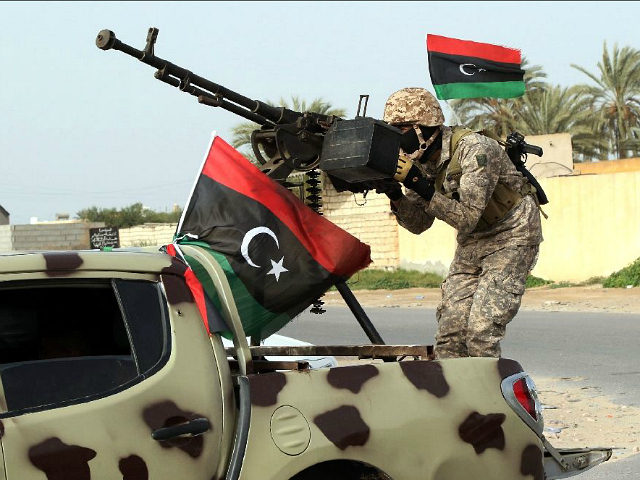WASHINGTON, D.C. — A U.S. general who has been nominated to lead the American military’s Africa Command told lawmakers he does not know if the Obama administration has a “grand strategy” in war-ravaged Libya, where U.S.-backed armed groups are fighting Islamic State jihadists.
America’s military footprint in Libya is limited despite an estimated 5,000 to 8,000 Islamic State terrorists currently operating in the region, reports Agence France-Presse (AFP).
The number of jihadists in Libya linked to the Islamic State, also known as ISIS or ISIL, has been growing in recent months.
Lt. Gen. Thomas Waldhauser, the nominee to replace Gen. David Rodriguez as chief of U.S. Africa Command (AFRICOM), indicated that he did not foresee President Barack Obama changing the level of U.S. commitment in Libya.
“I am not aware of any overall grand strategy at this point,” Gen. Waldhauser told the Senate Armed Services Committee Tuesday during a hearing on his nomination as AFRICOM commander.
He did say that the current, unspecified number of U.S. forces in the North African country is sufficient for the time being.
A contingent of U.S. Special Forces, described as small by some news outlets, is fighting the growing ISIS threat — lending support to armed groups in Libya from the air and on the ground “as the West moves to boost security operations in the country to bolster Libya’s increasingly desperate fight against ISIS,” reported CNN last month.
Citing anonymous U.S. officials, the Washington Post (WaPo) noted that the U.S. troops were “tasked with lining up local partners in advance of a possible offensive against the Islamic State,” adding that “two teams totaling fewer than 25 troops are operating… to identify potential allies among local armed factions and gather intelligence on threats.”
The U.S. has launched at least two airstrikes against ISIS in Libya. In April, Gen. Rodriguez stressed that the limited U.S. strikes have focused on targets “that pose an imminent threat to U.S. interests and personnel.”
AFP notes, “The Obama administration has preferred to let forces loyal to the Tripoli-based Government of National Accord (GNA) lead the fight against the ISIS group.”
The AFRICOM commander identified the pro-government groups fighting ISIS in Libya as militia forces and the remnants of the Libya national army.
ISIS’s biggest stronghold outside Iraq and Syria is the Libyan port city of Sirte, located only a few hundred miles from the shores of Europe.
However, forces loyal to the United Nations-brokered GNA, formed in January, “pushed into the city in tanks and pickup trucks mounted with machine guns… backed by air strikes and bombardment from ships in the Mediterranean,” reported the Independent on June 10.
The report added:
With Sirte mostly surrounded, there were reports that some militants were attempting to blend in with displaced civilians by ditching their distinctive clothing and facial hair.
In a statement, the Tripoli-based Government of National Unity (GNA) said its forces were in control of a military barracks, roads and bridges [in Sirte]…
The pro-government forces are being backed by the U.K. and other countries, including the U.S., which was expected to deploy a “second aircraft carrier and its strike group of guided-missile cruisers and destroyers to bolster operations Mediterranean,” noted the Independent.
Rida Issa, a Libyan naval commander reportedly said the entire coastline around the port city was under the government’s control.
“Dozens of fighters have been killed and hundreds wounded in a month of fighting in surrounding the symbolic city, which was the hometown of deposed leader Muammar Gaddafi and the scene of his death in the last major battle of the Libyan civil war [in October 2011],” pointed out the Independent.
Despite the deaths of at least 34 troops loyal to the Libyan government on Tuesday alone, Pentagon press secretary Peter Cook told reporters the fight against the jihadist group had “made progress.”
“We’re watching the situation in Libya very closely… We understand the potential threat that ISIL poses in Libya and elsewhere,” declared Cook.
ISIS capitalized on the political chaos and insecurity that followed the U.S.-backed removal of Gaddafi, conquering Sirte and 155 miles of surrounding coastline in late 2014.

COMMENTS
Please let us know if you're having issues with commenting.